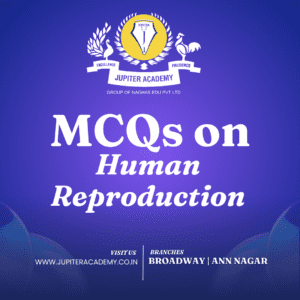NEET Crash Course | Jupiter Academy JupiterAcademy Chennai’s Leading NEET...
Read More
MCQs on Human Reproduction
Human reproduction is an important concept of biology from an academic perspective for various competitive and board exams. It is important for students to understand the various stages from fertilisation to embryo formation.
Here are some NEET multiple-choice questions on human reproduction along with their answers:
1. Which of the following is the primary male reproductive organ?
a) Prostate gland
b) Testes
c) Epididymis
d) Seminal vesicles
Answer: b) Testes
2. Fertilization in humans usually occurs in the:
a) Uterus
b) Ovary
c) Vagina
d) Fallopian tube
Answer: d) Fallopian tube
3. Which hormone is responsible for the development of secondary sexual characteristics in males?
a) Estrogen
b) Progesterone
c) Testosterone
d) Follicle-stimulating hormone
Answer: c) Testosterone
4. The release of a mature egg from the ovary is called:
a) Ovulation
b) Fertilization
c) Menstruation
d) Implantation
Answer: a) Ovulation
5. What is the average length of the menstrual cycle in females?
a) 7 days
b) 14 days
c) 28 days
d) 60 days
Answer: c) 28 days
6. Which of the following is not a barrier method of contraception?
a) Condom
b) Diaphragm
c) Intrauterine device (IUD)
d) Oral contraceptive pill
Answer: d) Oral contraceptive pill
7. The embryo implants and develops in which part of the female reproductive system?
a) Uterus
b) Cervix
c) Vagina
d) Ovary
Answer: a) Uterus
8. Which hormone is responsible for maintaining pregnancy in females?
a) Estrogen
b) Progesterone
c) Luteinizing hormone
d) Human chorionic gonadotropin (hCG)
Answer: b) Progesterone
9. The primary female reproductive organ is the:
a) Fallopian tube
b) Uterus
c) Ovary
d) Vagina
Answer: c) Ovary
10. Which of the following is the correct order of the stages of human embryonic development?
a) Blastocyst, zygote, fetus, embryo
b) Zygote, blastocyst, embryo, fetus
c) Fetus, blastocyst, embryo, zygote
d) Zygote, embryo, blastocyst, fetus
Answer: d) Zygote, embryo, blastocyst, fetus
11.Which of the following is not a part of the female reproductive system?
(A) Ovaries (B) Fallopian tubes (C) Uterus (D) Penis
Answer: (D)
The penis is part of the male reproductive system. The other three options are all part of the female reproductive system.
12.The process of fertilization in humans occurs in the:
(A) Fallopian tubes (B) Uterus (C) Cervix (D) Vagina
Answer: (A)
Fertilization in humans occurs in the fallopian tubes. The egg is released from the ovary and travels down the fallopian tube, where it is fertilized by a sperm.
13.The placenta is:
(A) A temporary organ that develops in the uterus during pregnancy (B) A structure that attaches the embryo to the wall of the uterus (C) A sac that contains the fetus (D) A structure that provides nutrients and oxygen to the fetus
Answer: (A)
The placenta is a temporary organ that develops in the uterus during pregnancy. It attaches the embryo to the wall of the uterus and provides nutrients and oxygen to the fetus.
14.The umbilical cord is:
(A) A structure that attaches the embryo to the wall of the uterus (B) A sac that contains the fetus (C) A structure that provides nutrients and oxygen to the fetus (D) A structure that carries waste products away from the fetus
Answer: (D)
The umbilical cord is a structure that carries waste products away from the fetus. It is attached to the placenta and the fetus at the umbilicus.
15.The average gestation period in humans is:
(A) 26 weeks (B) 38 weeks (C) 40 weeks (D) 42 weeks
Answer: (C)
The average gestation period in humans is 40 weeks. This is the time it takes for a fetus to develop in the uterus and be ready to be born.
These are some important human reproduction MCQs for class 12. Learn MCQs on related topics for biology only at Jupiter Academy.
NEET biology MCQs
Is VITEEE Tougher Than JEE Main? Exam Difficulty Comparison | Jupiter Academy
Is VITEEE Tougher Than JEE Main? A Clear Comparison for...
Read MoreJEE Mains 2026 – Official Notification by NTA Released
Advisory and Instructions on Updation of Aadhaar Card/ UDID Card/...
Read MoreNEET 2025: OMR Sheet Filling Tips to Avoid Mistakes
NEET 2025: OMR Sheet Filling Tips to Avoid Mistakes Preparing...
Read MoreMCQs on Human Reproduction MCQs on Human Reproduction MCQs on Human Reproduction MCQs on Human Reproduction MCQs on Human Reproduction MCQs on Human Reproduction MCQs on Human Reproduction MCQs on Human Reproduction MCQs on Human Reproduction MCQs on Human Reproduction MCQs on Human Reproduction MCQs on Human Reproduction





